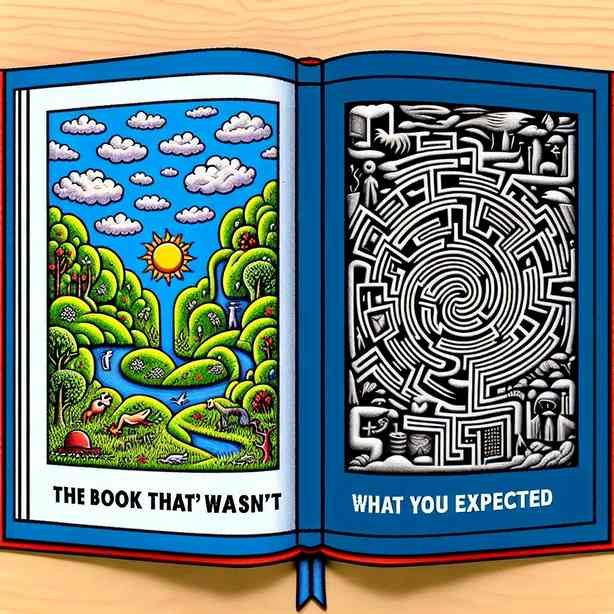
The Book That Wasn’t What You Expected
In the world of literature, every book has its own story to tell, both within its pages and in the circumstances surrounding its publication. However, not every book aligns with our expectations, and sometimes, the journey of discovering a book can lead to surprising revelations. This article seeks to explore the phenomenon of books that do not conform to our preconceived notions, examining various factors that can contribute to this disconnect and how it ultimately enriches our reading experience.
When we pick up a book, we often do so with certain expectations. These can stem from the genre, the author’s previous works, the book’s marketing, or even reviews from other readers. For instance, a mystery novel might lead us to anticipate suspenseful twists and turns, while a romance might promise a heartwarming journey of love. However, it is not uncommon to find that the story diverges from what we initially thought. This divergence can provoke a unique response, inviting us to reconsider our assumptions about genres, themes, and narrative styles.
One significant aspect to consider is the role of genre. Literature is often categorized into genres such as fiction, non-fiction, fantasy, science fiction, and more. Each genre comes with its own set of tropes and expectations. However, authors are increasingly blending these genres, resulting in works that challenge our understanding of literary boundaries. A fantasy novel may incorporate elements of historical fiction, while a crime thriller might delve into philosophical questions. Such hybridization can lead to a reading experience that is unexpected yet enlightening, pushing us to approach literature with a more open mind.
Moreover, the author’s intent can play a crucial role in shaping our expectations. An author who is known for a particular style may surprise readers when they take a more experimental approach in a new work. For example, an author celebrated for heartfelt narratives may write a satirical piece that critiques societal norms. This shift can initially leave readers disoriented, yet it can also provide an opportunity for deeper engagement with the text as we navigate the author’s new direction. In this way, the book becomes not just a story to be consumed but a dialogue that challenges us to think critically and reflectively.
Another factor that contributes to the surprising nature of some books is the influence of reader interpretation. Each reader brings their own background, experiences, and perspectives when approaching a text, which can lead to vastly different interpretations of the same story. What one reader might see as a straightforward romance, another might perceive as a complex exploration of human relationships and identity. This subjective variation highlights the richness of literature; a book does not belong solely to the author but also lives on in the minds of its readers. Therefore, when a book turns out differently than expected, it prompts us to explore our own biases and assumptions, leading to a more nuanced understanding of both the text and ourselves.
Publication marketing also plays an integral role in shaping expectations. Publishers often create promotional materials that highlight specific aspects of a book to attract certain audiences. This may lead potential readers to focus on certain themes or ideas while overlooking other significant elements. Consequently, a book might be marketed as a lighthearted comedy, only to reveal itself as a poignant exploration of deeper emotional themes. Such marketing strategies can mislead readers, yet they also present an opportunity for surprise and discovery, enticing us to look beyond the cover and the promotional blurb.
Additionally, books that challenge our expectations can serve as powerful tools for personal growth. When we encounter a narrative that confronts our beliefs or presents ideas that are unfamiliar, it can inspire us to question our own views. Literature has the power to evoke empathy and understanding, allowing us to step into the shoes of characters from different backgrounds and experiences. This process not only enriches our understanding of others but also encourages self-reflection and personal development. Consequently, books that deviate from our expectations can serve as catalysts for transformation, shaping our perspectives and broadening our horizons.
As we delve into the realm of literature, it is essential to embrace the unexpected elements that books present. Whether it is through genre-bending narratives, surprising author choices, varied reader interpretations, or compelling marketing strategies, the journey of reading can often lead us to unexpected places. These surprises invite us to engage more deeply with the text, challenging our assumptions and fostering a sense of curiosity.
In conclusion, books that do not meet our initial expectations have the potential to offer profound insights and transformative experiences. As readers, it is our responsibility to approach each story with an open mind, ready to embrace the unexpected twists and turns that literature has to offer. By doing so, we not only enhance our reading experience but also cultivate a deeper understanding of ourselves and the world around us. The next time you pick up a book and find it diverging from what you anticipated, take a moment to reflect on the new paths it might lead you down, for within those uncharted territories lies the magic of literature.


